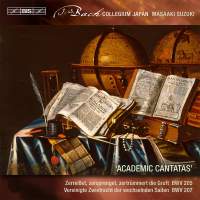Texte paru dans: / Appeared in: |
|
|
"Urgently recommended." |
|
|
Reviewer: Jerry
Dubins This is volume 4 in Masaaki Suzuki’s Secular Cantatas series, and it’s an absolute blast, both figuratively and literally, especially for those who love Bach at his most festive, with trumpets and drums blaring and arias in which the instrumental accompaniments are sinfonia-like, rhythmically invigorating workouts for the orchestral players. The first cantata on the disc, the title of which translates as “Destroy, burst, shatter the tomb,” was commissioned by the students of Leipzig University on behalf of a beloved professor, and it was premiered on his name day, August 3, 1725. It’s one of 12 surviving Festmusiken zu Leipziger Universitätsfeiern Bach composed for various university functions. The libretto, originally titled Der zufriedengestellte Aeolus (The contented Aeolus), is almost too silly to relate. Pallas Athene, the events planner, is worried that Aeolus will ruin the festivities by stirring up a summer storm. So she enlists Zephyrus, god of gentle winds, and Pomona, goddess of fruitfulness, to prevail upon Aeolus not to be a party pooper. On this thin shoelace of a plot, Bach hangs one of his longest cantatas—39 minutes—one filled with Brandenburg Concerto-like opening and closing choruses and a sequence of solo arias, vocal duets, and a trio that will have you tapping your feet and humming along with the music’s nonstop invention. Not too much shorter, at 33 minutes’ duration, is BWV 207, with the picturesque title, Vereinigte Zwietracht der wechselnden Saiten, which translates as “United discord of quivering strings.” One wonders if this was Bach’s attempt to reconcile the disunited strings in Vivaldi’s Il cimento dell’armonia e dell’inventione (Contest Between Harmony and Invention), but on further thought, probably not. BWV 207 is another of Bach’s “festive music” cantatas for the university, this time to hail the promotion of Gottlieb Kortte to a full professorship on December 11, 1726. The author of the libretto is unknown, though in keeping with the purpose of this congratulatory cantata, it’s filled with high-flown moralizing about the virtues of learning, teaching, and a life dedicated to the diligent pursuit of knowledge and truth. The seriousness of the occasion, however, did not deter Bach from providing a sequence of celebratory choruses and arias similar in vein to those in the companion cantata, BWV 205. The
vocal soloists—Joanne Lunn, Robin Blaze, Wolfram Lattke, and Roderick
Williams—are all familiar from one or another previous volume in Suzuki’s
surveys of Bach choral works; all are veteran Bach singers, and all are
excellent. When it comes to Bach’s cantatas, Suzuki, his Collegium Japan,
and BIS can do no wrong. So vitalizing and life-affirming is this music and
these performances of it that you’re likely to put the disc in your player,
press the repeat mode button, and listen to it over and over again. Urgently
recommended. | |
|
|
|
|
|
|
|
Cliquez l'un ou l'autre
bouton pour découvrir bien d'autres critiques de CD |
|




